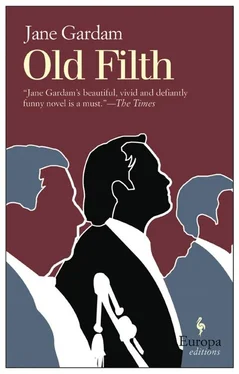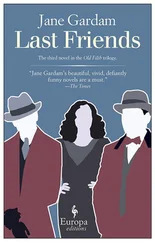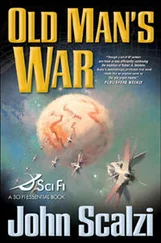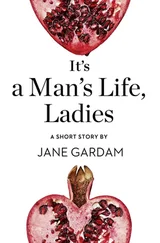“No. Well, yes. Maybe.”
“Is — are you alone?”
“Elsie’s lying down. Betty, Harry’s dead. My boy.”
The line died as Filth came bounding down the stairs in a London suit and black shoes. He swirled himself into his overcoat and looked about for the bowler hat which he had resurrected. It lay among the tulips. He reflected upon it and then let it lie. Mustn’t be antique. The taxi was here.
“Phone-call?”
“Nothing — cut off.”
They travelled first-class, though unintentionally as they both thought first-class was vulgar and only for expense-account people.
The ticket-collector, weighing up their age and clothes, had thought differently, seeing Teddy’s rolled umbrella and Betty’s glorious pearls and the rubbish on the floor around their polished shoes.
“You can upgrade, sir, if you like.” (The wife looks very pale.) “Just the next compartment and four pounds extra if you’re seniors.”
“Perfectly well here, thank you,” said Filth, but Betty smiled at the man’s black Tamil face, gathered up her bag and gloves and set off on her jaunty heels down the coach, tottering through the swaying connecting doors towards the firsts, away from what she still called “the thirds.”
They paddled through the water spilling out from under the doors of the W.C.s and settled in a blue velvet six-seater compartment. Four of the seats were slashed down the back with the stuffing coming out. Graffiti covered the ceiling but the floor was cleaner. Filth thought of the train to Kuala Lumpur, the mahogany and the hot food handed in, and sat facing his wife in the two unslashed seats on the window side. The fields, woods, hedges, uplands of Wiltshire, white chalk shining through the grass, flickered by.
Betty suddenly saw a hoopoe in a hedge. She looked at Filth to see if he had noticed it, but he was abstracted. The lines between his nose and mouth were sharp today, cruel as the slashes down the seats. Whatever had he to be bitter about?
His boy is dead. His boy, Harry .
The Tamil drew the door open.
“Better, sir?”
“Very nice,” said Betty.
“Four pounds? Is that each ?” asked Filth.
“Don’t bother with it, sir. When you look at the seats. . But it’s cleaner. Take my advice and get straight into first-class on the way home. You’ll be Day Returns?”
“Oh, yes. We don’t stay in London longer than we can help.” The man wondered why the lady’s eyes were so bright. Like it was tears. Real old. Could be his grandma. And yet — she was smiling at him.
“We’re going to London to sign our Wills.”
“Ma’am, I’m sure there’s plenty of time.”
Filth blew his nose on a starched handkerchief and drew down his eyebrows as if in Court. “In your profession, I wouldn’t count on that.”
“Too right,” said the man. “Takes our lives in our hands, we do on the railways. Safer flying. But that’s how I like it. When you gotta go, you gotta go? Right?”
“Right,” said Betty.
“Quite right,” said Filth. He was noticing Betty, her face tired through the make-up. He looked at her again as the train swayed insolently through Clapham junction. She must get her eyes seen to. They looked moist and strange. Old, he thought. She’s never looked old before.
“Lunch?” he asked.
“What?”
“Where are you having lunch? Shall we go somewhere together? Simpson’s?”
“But you’re going to the Inner Temple.”
“I can change it. Nobody’s expecting me. Don’t know a soul there now.”
She was silent.
“Then we could get a taxi to the place — the solicitor together. Not arrive separately. Hanging about on pavements.” “No,” she said. “I’ve made arrangements at the Club.”
“You don’t have to go. There’s never anybody else there.”
“That’s why I go. To keep it going. I’m meeting somebody this time.”
“You didn’t tell me.”
She thought: You didn’t ask.
At Waterloo she stood with him for his taxi, the driver coming round to help him in. The door was slammed and he tapped his window and called “Betty — where did you say you were going?” but she was gone. He saw her as he was taken down the slope, fast as a girl on her still not uninteresting legs, nipping through the traffic towards the National Theatre side. Must be walking all the way to the Club, he thought with pride. Crossing the bridge, down the Strand, Trafalgar Square, the Mall, St. James’s, Dover Street. Remarkable woman for over seventy. She loved walking. Strange the hold that University Women’s Club had over her. Never been there himself. Betty, of course, had never been to a university. She’d vanished now.
He had not seen her take a right down the steps towards the Film Theatre and the Queen Elizabeth Hall. In the National Theatre she took a tray and shoved it along in the queue of the audience for the matinee for Elektra .
She had no idea what she ate. She took the lift to the high level of the theatre and sat outside alone in the cold air. She was meeting nobody. There were buskers everywhere: acrobats, musicians, living statues, contortionists and a sudden deluge of sound from a Pavarotti in a loin cloth. The waves of the canned music made the pigeons fly. Two people sat down on the seat beside her, the girl with her hair in two wings of crinkled gold. Heavy, sullen, resentful, the boy slumped beside her, his mouth slack. The music and the voice blazed away.
His boy Harry is dead.
The girl lit a cigarette, her fingers and thumbs chunky with rings.
Rings on her fingers and bells on her toes — and goodness knows where else, thought Betty. She shall have music wherever she goes. Oh, I do hope so.
The girl was staring at her.
“I like your hair,” said Betty.
The girl turned away, haughtily. “Nothing lasts long,” said Betty, and the boy said, “We could go for a Chinese.”
They thought about it.
Then the two of them turned to each other on the seat and in one fluid movement entwined themselves in each other’s arms.
His boy is dead , thought Betty and got up.
She wandered away down steep, spiral stairs and at the riverbank watched the water streaming by, the crowds, the silver wheel high in the air dotted with silver bullets. Beautiful. It jerked awake. Jerk, stop, fly. Round and round.
Terry’s boy is dead .
And I’m not, she thought. Filth and I are going to live for ever. Pointlessly. Keeping the old flag flying for a country I no longer recognise or love.
When she saw the state of the traffic down the Strand she wondered if Filth would make it to the solicitor’s in time. He liked ten minutes zizz after lunch in the smoking-room of the Inn. Hopeless without it. She thought of him, tense and angry, traffic-blocked in his taxi. A few years ago he’d have sprung out and walked. He had been a familiar sight, gown and papers flapping, prancing to the Law Courts. “Look, isn’t it Old Filth?”
When he’d been very young and not a penny, not a Brief, before she knew him, he’d always, he said, had a bowler hat for going home. “Why?” she had asked.
“To have something to raise to a judge.”
You never knew when Filth was being sardonic or serious.
He was not being sardonic today. With the help of the rolled umbrella he was signalling to taxis outside his Inn on the Embankment. He moved his feet rather cautiously and looked ancient, but still handsome, beautifully dressed, alert after his ten-minute nap, someone you’d notice. But the traffic streamed by him. Nothing stopped. He’d never get there. Too old for this now. He’d be late for Court. He began to be frightened as he used to be. His throat felt tight.
Читать дальше












